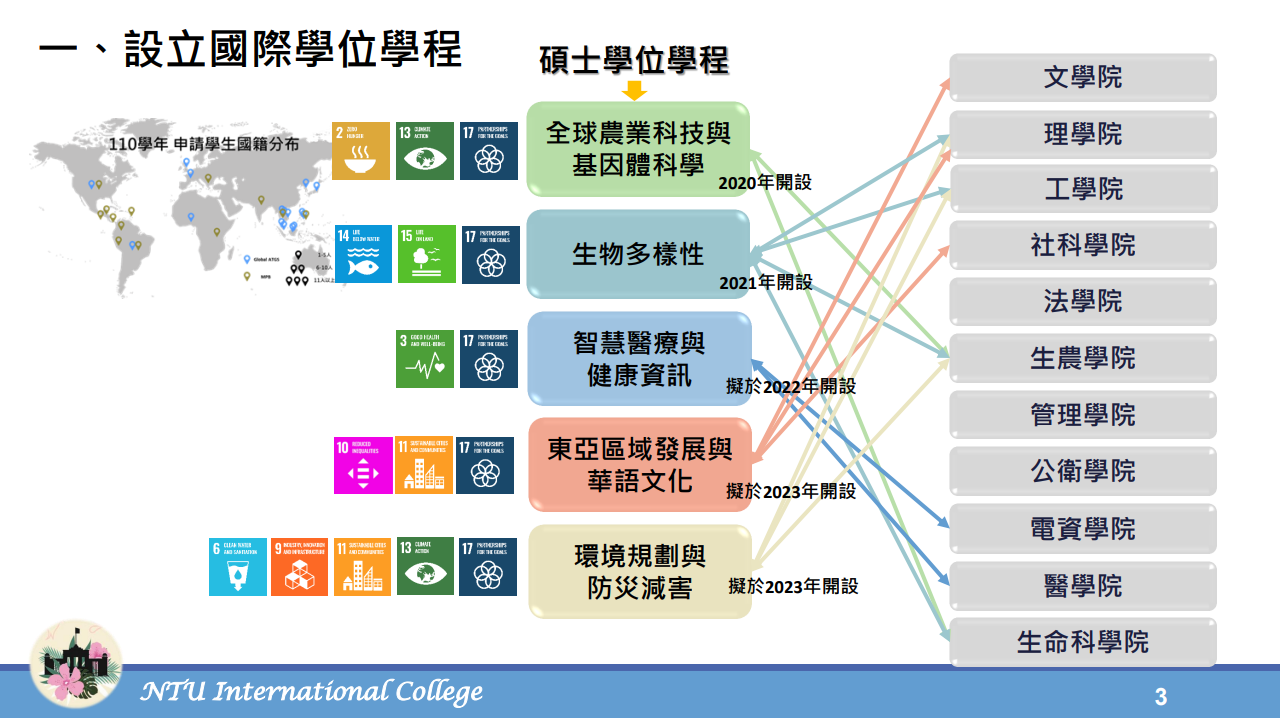NTU Sets Up Sustainable Development Oriented Programs
NTU's International College echos the sustainable development goals and offers sustainable development oriented programs: Master of Science in Global Agriculture Technology and Genomic Science (2020), Master of Science in Biodiversity (2021), Master of Science in Smart Medicine and Health Informatics (2022), Master of Arts in East Asian Regional Development (2023), Chinese Language and Culture, Master of Science in Environment Planning and Crisis Risk Reduction (2023). These programs cover SDG 2, SDG 3, SDG 6, SDG 9, SDG 10, SDG 11, SDG 13, SDG 14, SDG 15, and SDG 17.

GLIP: Distance Co-Learning with East Asian Partners
NTU worked with the Association of East Asian Research Universities(AEARU) to create the "Global Learning Initiatives Program," inviting member universities to offer cross-disciplinary courses. NTU offered 3 courses focusing on SDG 3 and SDG 11 in Spring 2021.
(SDG 12) Green Chemical: For a more sustainable future
Our society and industry’s needs for clean technology solutions has been growing. Thus, to tackle today’s environmental challenges, NTU offers the following two interdisciplinary doctoral programs: PHD Program of Green Materials and Precision Devices and Taiwan International Graduate Program for Sustainable Chemical Science and Technology.

(SDG 13) The International Degree Program in Climate Change and Sustainable Development (IPCS)
The IPCS is an interdisciplinary degree program that encompasses a global perspective. The program provides students with not only the basics but also integrated knowledge, with a view of educating international and interdisciplinary talents and decision-makers who specialize in climate change research and sustainable development policy.

(SDG 2, SDG 3) GIP-TRIAD aims to solve global-scale problems in health maintenance and food security
The International Joint Degree Master's Program in Agro-Biomedical Science in Food and Health (GIP-TRIAD) was jointly established in 2017 by National Taiwan University, University of Tsukuba, and University of Bordeaux, to educate global talents, promote research, and address the "unsatisfied needs" of society. The program focuses on such fundamental challenges as food production and security, public health, health maintenance, disease prevention, and treatment.

(SDG 13) The International Degree Program in Climate Change and Sustainable Development (IPCS)
The IPCS is an interdisciplinary degree program that encompasses a global perspective. The program provides students with not only the basics but also integrated knowledge, with a view of educating international and interdisciplinary talents and decision-makers who specialize in climate change research and sustainable development policy.

(SDG 2, SDG 3) GIP-TRIAD aims to solve global-scale problems in health maintenance and food security
The International Joint Degree Master's Program in Agro-Biomedical Science in Food and Health (GIP-TRIAD) was jointly established in 2017 by National Taiwan University, University of Tsukuba, and University of Bordeaux, to educate global talents, promote research, and address the "unsatisfied needs" of society. The program focuses on such fundamental challenges as food production and security, public health, health maintenance, disease prevention, and treatment.





